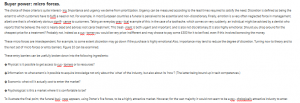Buyer power: micro forces.

The choice of these criteria is quite interest- ing. Importance and urgency we derive from prioritization. Urgency can be measured according to the lead times required to satisfy the need. Discretion is defined as being the extent to which customers have to fulfil a need or not. For example, in most European countries a funeral is perceived to be essential and non-discretionary. Finally, emotion is a very often neglected force in management, albeit one that is of relatively obvious signifi- cance to customers. Taking an everyday prac- tical example of this: in the case of a toothache, which comes on very suddenly, an individual might be advised by a dentist who reports that he believes the root is nearly dead and advises root canal treatment. This treat- ment is both urgent and important, and is also not discretionary. It is also highly emotional. Should you shop around for the cheapest price for a treatment? Probably not, indeed as a cus- tomer you would be very price-indifferent and may choose to pay some £300 for it to be fixed, even if this involved borrowing the money.
These micro forces are interdependent. For example, to some extent discretion may go down if the purchase is highly emotional.Also, importance may tend to reduce the degree of discretion. Turning now to theory and to the next set of micro forces or entry barriers, Figure 10 can be examined.
These entry barriers can be usefully broken down into the following ingredients:
� Physical: is it possible to get access to cus- tomers or to resources?
� Information: to what extent is it possible to acquire knowledge not only about the ‘what’ of the industry, but also about its ‘how’? (The latter being bound up in tacit competences.)
� Economic: what will it actually cost to enter the market?
� Psychological: is this a market where it is comfortable to be?
To illustrate the final point, the funeral busi- ness appears, using Porter’s five forces, to be a highly attractive market. However, for the vast majority it would not seem to be a psy- chologically attractive industry to enter.